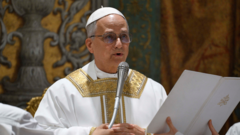Cardinal Robert Francis Prevost, now Pope Leo XIV, has made history as the first American pope of the Roman Catholic Church, promoting unity and dialogue in his inaugural address while emphasizing his past experiences in Peru.
Historic Election: First American Pope Takes the Throne

Historic Election: First American Pope Takes the Throne
The Vatican witnesses history as Cardinal Robert Francis Prevost is elected the first U.S. pope.
Article text:
In a landmark event for the Roman Catholic Church, Robert Francis Prevost has been elected as the 267th pope, taking the name Leo XIV. This historic choice marks the first time an American has held the papal office, a development that defies centuries of tradition and expectation. The newly elected pope addressed an enthusiastic crowd gathered in St. Peter’s Square, delivering a message of peace, stating, “Peace be with you.”
Jason Horowitz, our esteemed Rome bureau chief, remarked on the significance of this selection, noting that the belief of a pope emerging from a global superpower was largely considered unthinkable. With the current socio-political climate shifting, the Vatican seems to embrace new possibilities that were previously unimaginable.
Prior to his election, Cardinal Prevost, 69, was seen as a moderate figure amid swirling ideological debates regarding the Church's direction—whether to uphold the inclusive legacy of Pope Francis or revert to more traditional approaches. His supporters championed him as a candidate capable of uniting these opposing views. In his first address as pope, Leo XIV called for greater collaboration and connection among believers.
News of his election reverberated far and wide, drawing celebrations not only in Vatican City but also in his hometown of Chicago and the country of Peru, where he dedicated over two decades of his service. Former President Trump heralded Leo XIV's election as a tremendous honor for the United States.
As he embarks on this new journey, Pope Leo XIV's life reflects a rich tapestry of experiences beyond American borders. He has served as a missionary, priest, educator, and bishop in Peru while also holding significant responsibilities within the Vatican hierarchy—most notably, overseeing the selection and management of bishops worldwide.
Looking ahead, Pope Leo XIV's schedule includes a Mass celebration at the Sistine Chapel with the cardinals, a prayer at St. Peter's Basilica, and a meeting with journalists at the Vatican. The world watches closely as he prepares to lead the Church into a new era.
In a landmark event for the Roman Catholic Church, Robert Francis Prevost has been elected as the 267th pope, taking the name Leo XIV. This historic choice marks the first time an American has held the papal office, a development that defies centuries of tradition and expectation. The newly elected pope addressed an enthusiastic crowd gathered in St. Peter’s Square, delivering a message of peace, stating, “Peace be with you.”
Jason Horowitz, our esteemed Rome bureau chief, remarked on the significance of this selection, noting that the belief of a pope emerging from a global superpower was largely considered unthinkable. With the current socio-political climate shifting, the Vatican seems to embrace new possibilities that were previously unimaginable.
Prior to his election, Cardinal Prevost, 69, was seen as a moderate figure amid swirling ideological debates regarding the Church's direction—whether to uphold the inclusive legacy of Pope Francis or revert to more traditional approaches. His supporters championed him as a candidate capable of uniting these opposing views. In his first address as pope, Leo XIV called for greater collaboration and connection among believers.
News of his election reverberated far and wide, drawing celebrations not only in Vatican City but also in his hometown of Chicago and the country of Peru, where he dedicated over two decades of his service. Former President Trump heralded Leo XIV's election as a tremendous honor for the United States.
As he embarks on this new journey, Pope Leo XIV's life reflects a rich tapestry of experiences beyond American borders. He has served as a missionary, priest, educator, and bishop in Peru while also holding significant responsibilities within the Vatican hierarchy—most notably, overseeing the selection and management of bishops worldwide.
Looking ahead, Pope Leo XIV's schedule includes a Mass celebration at the Sistine Chapel with the cardinals, a prayer at St. Peter's Basilica, and a meeting with journalists at the Vatican. The world watches closely as he prepares to lead the Church into a new era.




















